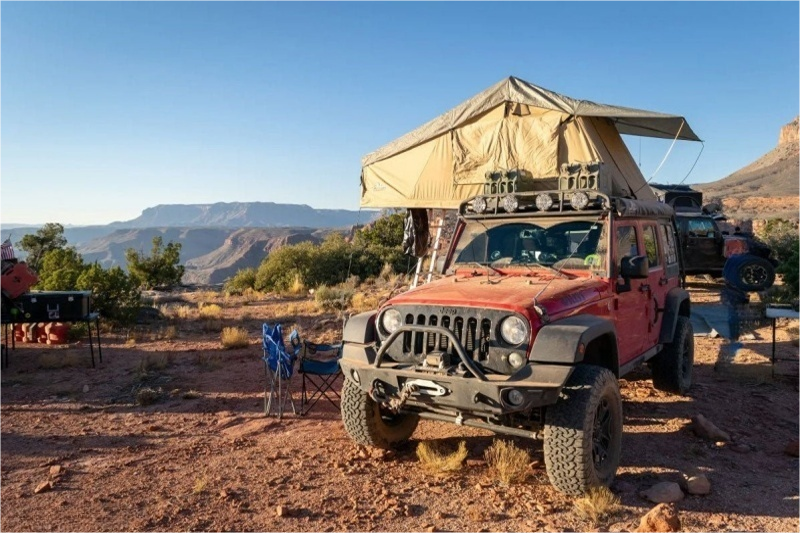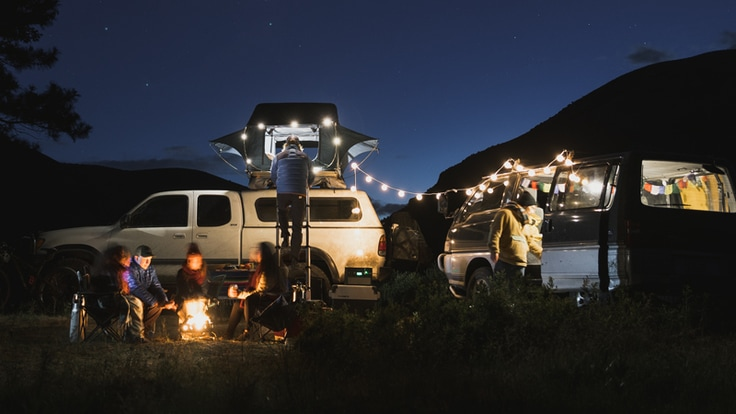The Differences Between Overlanding and Car Camping
Overlanding has witnessed a surge in popularity over the past decade. Its roots can be traced back to the early 20th-century Australian outback, where it was primarily associated with cattle drivers. However, the term "overlanding" has since evolved to encompass a broad spectrum of mechanized travel, both off-road and on-road, all centered around the idea that the journey itself holds more significance than the ultimate destination.
While some purists argue that true overlanding necessitates crossing international borders, the definition has become more flexible as it has gained mainstream acceptance. It now loosely encompasses a blend of off-roading, remote travel, and camping.
When people envision camping, they often conjure up images of setting up tents in established campgrounds and relishing s’mores by the campfire. Nevertheless, there's another camping experience on the rise: overlanding. Overlanding is frequently mistaken for car camping, but the two are distinct in several ways. Both offer avenues to escape the daily grind and connect with nature, but overlanding elevates camping to a whole new level. In this article, we will explore the differences between overlanding and car camping to clarify any confusion and help you understand the distinct attributes and advantages of each camping style.
What is Overlanding?
Overlanding is a form of self-reliant travel that entails exploring remote or off-road regions using a robustly equipped vehicle stocked with camping gear, food supplies, and water resources. Overlanding often involves traversing diverse terrains and landscapes, such as deserts, mountains, forests, and waterways, often extending over extended periods, spanning weeks or even months. The primary aim of overlanding is to embrace the journey itself and connect intimately with the natural environment, with less emphasis on reaching a specific destination.
Furthermore, overlanding provides the opportunity to venture into less-traveled locations, experience a heightened sense of adventure and self-sufficiency, and forge a deeper connection with nature compared to car camping.
Overlanding necessitates a higher level of self-sufficiency and meticulous planning compared to car camping. Overlanders must carry all necessary supplies, as they may not have access to nearby towns or amenities. They must also be prepared for contingencies such as vehicle breakdowns or medical emergencies, particularly when venturing into remote areas far from civilization.
While not obligatory, overlanders often employ specialized vehicles like 4x4 trucks or SUVs, equipped to handle challenging terrain and steep inclines. They may also possess specialized equipment like rooftop tents, off-road tires, and winches, enabling them to establish camps in more secluded locations.
What is Car Camping?
Car camping, on the other hand, entails setting up camp in designated campgrounds or established campsites, often equipped with amenities such as restrooms, fire pits, showers, and picnic tables. Car campers typically utilize a vehicle outfitted with basic camping gear, including tents, sleeping bags, and cooking supplies. They may also have access to nearby towns or facilities for purchasing food and supplies, and transportation to and from their campsite is generally convenient.
Conversely, car camping offers a more accessible and straightforward way to partake in camping. It demands less planning and self-sufficiency compared to overlanding. Car campers can bring along more gear and supplies as they are not burdened with carrying everything on their backs or in their vehicles.
Car camping often serves as a weekend or short-term camping experience, thanks to its ease of planning and execution. It provides an excellent means to relish the outdoors and connect with nature without the need for intricate planning or specialized equipment.
Frequently, the question arises: "What sets overlanding apart from camping?" As overlanding has gained popularity, distinguishing between the two has become increasingly challenging.
Here's a straightforward guideline we use to differentiate traditional vehicle-based camping from Overlanding:
Generally, for a trip to qualify as "overlanding," it would involve:
So, if you plan to camp in a local state or national forest for a weekend and your distance from home is less than 100 miles, it would typically be regarded as "camping."
Conversely, if you're embarking on a multi-week journey along mostly off-highway routes, spanning thousands of miles across multiple states, provinces, or even countries, then most would classify your adventure as overlanding, aligning with its true essence.
Despite heated debates over drawing clear distinctions, a useful analogy can be drawn from the distinct terms used to differentiate "hiking" from "backpacking." Both involve distinct objectives, just as "overlanding" and "camping" pursue different goals.
Choosing Your Ideal Camping Style
When contemplating whether to embark on an overlanding or car camping adventure, it's crucial to consider your camping objectives, preferences, and level of experience. Here are some factors to contemplate to help you determine which camping style aligns better with your needs:
Terrain and Destination: Overlanding typically unfolds in remote and rugged areas, necessitating a specialized vehicle, whereas car camping can be executed in established campgrounds and recreational areas. If your plans involve exploring off-the-beaten-path destinations that demand a four-wheel-drive vehicle and advanced off-road skills, overlanding might be a more suitable choice. However, if you seek a conventional camping experience in picturesque settings with easy access to conveniences like restrooms, water, and electricity, car camping may be your preference.
Equipment and Gear: Overlanding demands specialized equipment and gear, including a capable vehicle, rooftop tent or camping trailer, portable fridge/freezer, water filtration system, and other camping essentials. Car camping, conversely, requires fewer specialized items and can be undertaken with a simple tent, sleeping bag, and cooler. If you already own a four-wheel-drive vehicle and enjoy the challenge of outfitting it for off-road adventures, overlanding might be a good match for you. Conversely, if you prefer a more minimalist approach to camping or don't wish to invest in specialized gear, car camping might be a more suitable choice.
Skill Level and Experience: Overlanding necessitates a higher skill level and experience compared to car camping, as it entails navigating challenging terrain, conducting basic vehicle maintenance, and managing unforeseen situations in natural surroundings. If you possess proficiency in off-road driving, vehicle upkeep, and outdoor survival skills, Overlanding may align well with your expertise. If you are new to camping or prefer a more relaxed camping experience, car camping may be the more fitting option.
Selecting Your Adventure Style
Ultimately, the decision between overlanding and car camping hinges on your personal inclinations, camping aspirations, and skill level. By contemplating these factors, you can opt for the camping style that best aligns with your requirements and allows you to relish the great outdoors on your terms.
